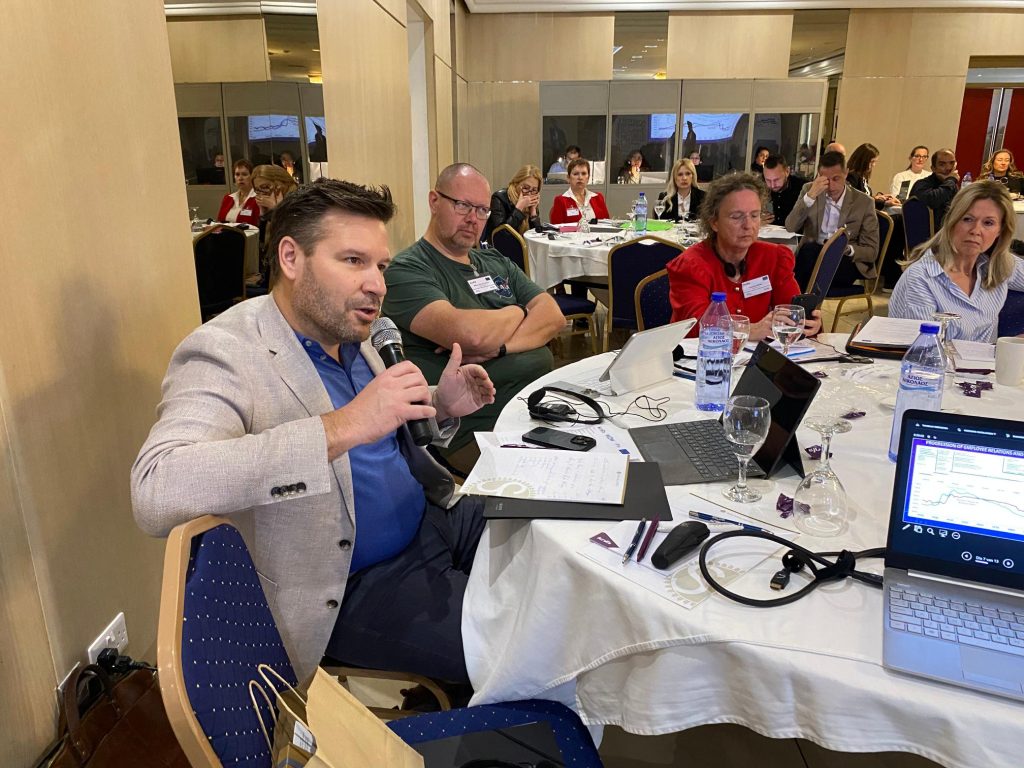Focusing on the wellbeing of your employees should not be underestimated. Making sure that people are satisfied and feel respected and heard undoubtedly improves results. Wellbeing at the workplace pays off. That is a claim. But it is also a claim that probably belongs in the category “common sense” for most people. Work is more than only the act. It gives a person fulfilment and a sense of belonging. If work is not giving this then there is room for improvement.
Over 50 trade union leaders from a large share of the EU Member States participated in a two-day seminar titled “Work is more than just the act: How to improve the wellbeing of employees – also in view of increasing harassment at the workplace?”. The seminar took place in Larnaca, Cyprus on 21 and 22 February 2024. The initiative was organized by Krifa and WOW-Europe in cooperation with the European Centre for Workers’ Questions (EZA) and funded by the European Union.
Jane Heitmann, President of Krifa opened the seminar by stating that wellbeing is a focal point for the Danish union. It is for that reason that the Job Satisfaction Index was created. Monitoring the wellbeing of employees has resulted in a better understanding of its importance. WOW President, Wayne Prins from the CLAC in Canada confirmed that promoting wellbeing is a selling point for companies. Certainly in a tight labour-market.
Employee Relations vs HRM
‘Sound employee relations are key, but what are these?’, Asked George Ashikalis, Visiting Lecturer at the CIM Cyprus Business School. There are four categories to be distinguished: Industrial Relations; Labour Relations; Personnel Management; Human Resource Management. Throughout the last hundred years the focus of the employee relations have shifted. According to Ashikalis there is a negative relation between HRM and earnings. The most striking difference between Employee Relations (Emphasis on employees/social solutions) and HRM (Emphasis on employer solutions on labour issues) is leading to adversarial perspectives. What is important for the first is not necessary important for the second. Equality and equity are two very different issues.
Holistic approach
Today the distinction between work and personal life has become rather vague. This reality makes that ‘it is imperative for us, as leaders and stakeholders in our respective organizations, to recognize that the wellbeing of our employees is not merely a matter of corporate responsibility, but a strategic imperative. A happy, healthy, and motivated workforce is the cornerstone of a thriving and sustainable business’, Taleen Tchalikian, Vice-President People & Culture Celestyal stated. It is important to take a holistic approach that encompasses physical, mental, and emotional health, she added.
Amplition, prevention, curation
At the Dutch Achmea they are trying to apply the holistic approach towards wellbeing through a number of initiatives. Achmea perceives wellbeing as a sustainable value for customers, employees, company and society alike. Within the HR Expertise Team there are employability experts who manage employability, absenteeism &
reintegration (prevention & curation) and there is a team for healthy working that activates healthy working & living and strengthens vitality (amplition and prevention). Renate van den Bosch-Moerkerk, Wellbeing consultant Achmea stated that at Achmea wellbeing is key. She said that ‘Employees who strongly feel that their employer cares about their wellbeing: have 71% less chance of severe burnout, are 69% less likely to actively look for a new job, show 36% more happiness in life, are 3x more involved and enthusiastic, and are 5x more likely to express strongly positive opinions about their employer’. Achmea offers ‘a wide range of wellbeing interventions, online platform with programs and services on organizational, team and individual level’. And it created Healthy Working Plazas in the different offices, thereby offering easy accessible spaces for the employees to work on their wellbeing. This shows how important Achmea finds its employees.
Job Satisfaction Index
Job satisfaction is of great value and an important part of the solution of the shortage of labour. Rolf Weber, Political Consultant, and Mikael Arendt Laursen, Vice-President, both from the Danish union Krifa demonstrated that job satisfaction is of great value to employees, companies and society. Through the Job Satisfaction Knowledge Centre that Krifa has founded in 2015, the job satisfaction of Danes is researched and analysed and published in the Job Satisfaction Index. Rolf Weber stated that ‘Through questions about the 7 factors (Influence, Mastery, Leadership, Balance, Purpose, Achievements, Colleagues) that together create Job Satisfaction it is possible to see how satisfied an employee is. The index shows that Meaning, Mastery and Balance are considered particularly valuable factors.’ Investing in job satisfaction benefits employees, companies and society in numerous ways. For employees on a personal and also financial level. For companies through less job changing and less sick leave. For society later retirement and decrease in health-care costs. Higher Job Satisfaction also increases the labour supply. When workers thrive more they, their wellbeing increases and they will also contribute more and better, Mikael Arendt Laursen said.
The delegates were then invited to answer a number of questions online and to see what their Job Satisfaction Index Score was. Sara Nedergaard Askholm explained that the version filled in by the delegates is the short version. For companies there is a more extensive list of questions to be answered. Companies can themselves decide how often their employees do the test. Some employees do this four times a year. This helps both the employee and the company to see where they stand.
Types of wellbeing
So what is wellbeing? What defines wellbeing? Elena Maniatopoulou Hadjipanayi, Chief People Officer Tototheo Maritime in her contribution titled “Unravelling Employee Wellbeing” intended to give an answer. There are a number of types of wellbeing: Mental, Emotional, Social, Financial, Physical. In Cyprus through Employee Assistance Programs (EAPs) employers can sponsor confidential and voluntary programs designed to support employees in managing personal or work-related issues that may impact their wellbeing, health, or job performance. ‘This goes from counselling and mental health services, to crisis intervention, and financial and legal assistance. Employers know that the organization benefits when employees are not struggling with overwhelming personal stressors’, Maniatopoulou Hadjipanayi said. ‘As a result of distrust, poor promotion, and stigma the usage of EAP is only 10%’, she added.
Harassment and violence at the workplace
An important factor for wellbeing at the workplace is the way an employee is treated by his superiors and colleagues. Harassment (sexual) and violence (physical, psychological, cyber) at the workplace are important factors not to be overlooked and that determine the feeling of satisfaction and pleasure at work. Sexual harassment, mobbing and bossing (psychological terror against an employee by an employer or management) dramatically affect people mentally. So why does it seem impossible to eradicate and fight harassment and violence. ‘The main obstacles are the culture of silence, lack of awareness, power dynamics, victim blaming, legislation, difficult to proof, amongst others,’ Irina Semjonova, Advisor of the Latvian United Police Trade Union said. Solutions should be found at the company level and society. According to Irina Semjonova, ‘we will have to educate people about the consequences, we will have to make legislation and develop mechanisms where the ill-treatment of colleagues can no longer take place. Zero tolerance and public awareness is needed.’
Importance of influence
The final speaker dealt with the issue of the power of influence and on how to set the parameters for wellbeing. Wolfgang Pischinger, President of WOW-Europe and the FCG/GPA in Austria discussed the ways of how influence can limit abuse and improve wellbeing. In groups the delegates discussed what is important to them when it comes to wellbeing. Jane Heitmann, President of Krifa stated that ‘EU policy is crucial. It is important for us as unions that we engage in having influence in Europe.’
Wellbeing affects us all and it is true that together we should make sure that people have pleasure in the work they do and are satisfied with the results. Both on a personal level as well as on company and societal level. The time at work forms a large and important part of people’s lives and we need to be cautious of these people. The unions play a pivotal part in this by setting the standards. Still, as became clear once more, much is still to be done.
for pictures click here





